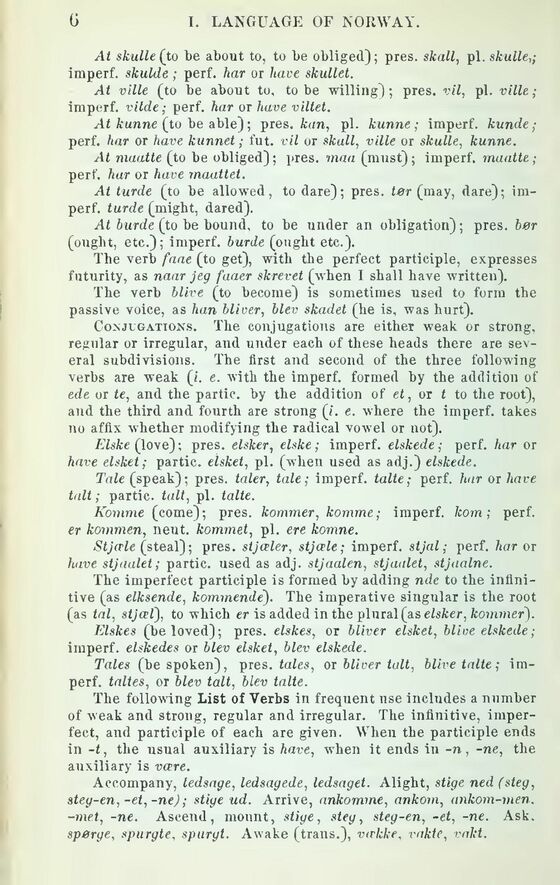
Full resolution (JPEG) - On this page / på denna sida - Sketch of Norwegian and Swedish Grammar, with Vocabulary and List of Phrases - I. The Language of Norway

<< prev. page << föreg. sida << >> nästa sida >> next page >>
Below is the raw OCR text
from the above scanned image.
Do you see an error? Proofread the page now!
Här nedan syns maskintolkade texten från faksimilbilden ovan.
Ser du något fel? Korrekturläs sidan nu!
This page has never been proofread. / Denna sida har aldrig korrekturlästs.
At skulle (to be about to, to be obliged); pres, skall, pl. skulle,;
imperf. skulde ; perf. har or have skullet.
At ville (to be about to, to be willing); pres, vil, pl. ville;
imperf. vilde; perf. har or have viltet.
At kunne (to be able); pres, kan, pl. kunne; imperf. kunde;
perf. har or have kunnet; fut. vil or skull, ville or skulle, kunne.
At niaatte (to be obliged); pres, maa (must); imperf. maatte;
perf. har or have maattet.
At turde (to be allowed, to dare); pres, ter (may, dare);
imperf. turde (might, dared).
At burde (to be bound, to be under an obligation); pres, her
(ought, etc.); imperf. burde (ought etc.).
The verb faae (to get), with the perfect participle, expresses
futurity, as naar jeg faaer skrevet (when I shall have written).
The verb blive (to become) is sometimes used to form the
passive voice, as han bliver, blev skadet (he is, was hurt).
Conjugations. The conjugations are either weak or strong,
regular or irregular, and under each of these heads there are
several subdivisions. The first and second of the three following
verbs are weak (i. e. with the imperf. formed by the addition of
ede or te, and the partic. by the addition of et, or t to the root),
and the third and fourth are strong (i. e. where the imperf. takes
no affix whether modifying the radical vowel or not).
Elske (love); pres, elsker, elske; imperf. elskede; perf. har or
have elsket; partic. elsket, pi. (when used as adj.) elskede.
Tale (speak); pres, taler, tale; imperf. talte; perf. har or have
talt; partic. talt, pl. talte.
Komme (cojpe); pres, kommer, komme; imperf. kom; perf.
er kommen, neut. kommet, pl. ere komne.
Stjæle (steal); pres, stjaler, stjale; imperf. stjal; perf. har or
have stjaalet; partic. used as adj. stjaalen, stjaalet, stjaalne.
The imperfect participle is formed by adding nde to the
infinitive (as elksende, kommende). The imperative singular is the root
(as tal, stjæl), to which er is added in the plural (as elsker, kommer).
Elskes (beloved); pres, elskes, or bliver elsket, blive elskede;
imperf. elskedes or blev elsket, blev elskede.
Tales (be spoken), pres, tales, or bliver talt, blive talte;
imperf. taltes, or blev talt, blev talte.
The following List of Verbs in frequent use includes a number
of weak and strong, regular and irregular. The infinitive,
imperfect, and participle of each are given. When the participle ends
in -t, the usual auxiliary is have, when it ends in -n, -ne, the
auxiliary is vcere.
Accompany, ledsage, ledsagede, ledsaget. Alight, stige ned (steg,
steg-en,-et,-ne); stige ud. Arrive, ankomme, ankom, ankom-men.
-met, -ne. Ascend, mount, stige, steg, steg-en, -et, -ne. Ask.
spørge, spurgte, spargt. Awake (trans.), vække, vakte, vakt.
<< prev. page << föreg. sida << >> nästa sida >> next page >>